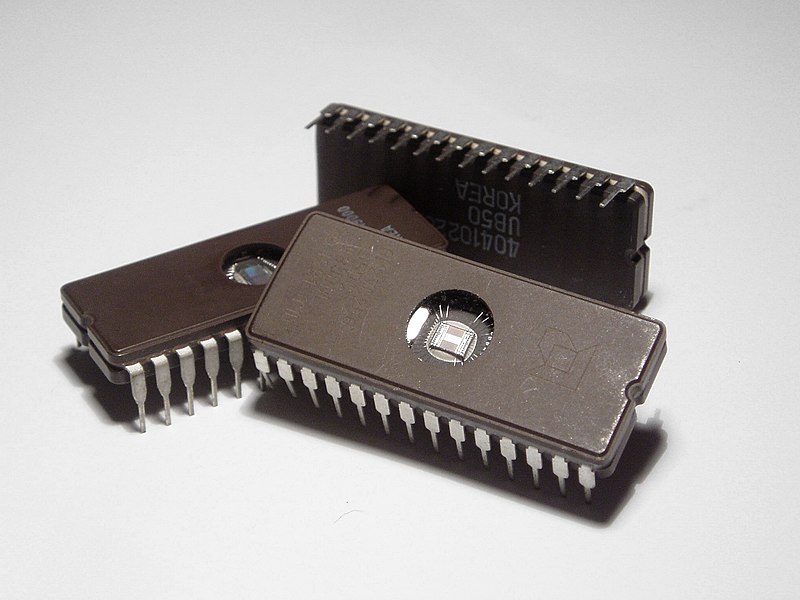
by Richard Peacock
How Computers Compute
Unless you are some sort of psychic vampire currently reading my mind, you are enjoying this article on a computer. And if you are a psychic vampire, taste a little of this-- ha ha! That's right! I'm thinking about giving Henry Kissinger a sensual massage and there's nothing you can do about it!
But for the rest of you, you may be wondering just how it is that computers work. How does a chip made of plastic, metal, and ectoplasm perform mathematical operations and connect you to single women looking for a good time?
My silly old grandfather used to tell me that "fairies" used "magic" to construct computer chips. But, of course, every child must eventually grow up one day. So, as I got older and wiser, I began to wonder just how exactly did the fairies create electronics, and why did most of the world's fairies seem to live in Japan and Korea?
Computer chips (or "fairy squares") are composed of thousands, millions, billions, or even tens of transistors, all shrunk down to microscopic sizes using alien technology which the fairies acquired during their long struggle for independence/the right to own slaves. In fact, the first computer chips weren't chips at all, but large circuits made of several integrated transistors. It wasn't until the transistors became fruitful and multiplied did computers become truly powerful.
So what's the big freakin' deal with transistors?! Okay... first of all... calm down. Good. You see, Japanese engineers (ie, fairies in their larval stage) construct "logic gates" out of transistors, which let a chip send electricity down one pin or the other, based on some condition. If you string together logic gates in particular ways, you can create circuits to perform mathematical operations, which are at the heart of everything that happens in your computer; from doing taxes, to playing video games, to looking up amputee porn, it all boils down to chips in your computer doing math.
So what's next for computers? Some say quantum computing. Others say some kind of hamster-running-on-a-wheel based processor. But I believe the most likely course is that computers will remain exactly the same, both in power and in price, while fairies turn their attention to improving their newest invention: fleshlights.
Science Rocks is written by Richard Peacock, inventor of the communication satellite. He now lives in Sri Lanka where he ponders the riddles of this, and other worlds. Email him at richard@amateurscientist.org.
Friday, October 31, 2008
How Computers Compute
Labels:
Richard Peacock,
Science Rocks
How Computers Compute_t~~_http://amateurscientistblog.blogspot.com/2008/10/how-computers-compute.html
Blog Archive
-
▼
2008
(518)
-
▼
October
(57)
- How Computers Compute
- Priest Talking Straight
- Quite an Intereshting Shtory
- Vikings: History's Metrosexuals
- The Cyprus Serpent
- Utah Still Not a Place You'd Want to Live
- The Hate Circuit
- Ted "The Tubes" Stevens Found Guilty
- Liveblogging the Election
- Psychic Confession
- Racists: Idiots
- Al-Qaeda for McCain '08
- The Goodish Samaritan
- Dr. Computer
- Bronx Cheer for Your Health
- Elections Schmelections
- Indians on the Moon
- Elephant Flower
- Sticky X-Rays
- Princeton Publishes Hacking How-To for E-Voting Ma...
- Hot, Hot Tidal Heat
- Excommunicated Education
- The Promise of Buckypaper
- The Smell of Space
- I am the Very Model of Biological Evolution
- The Amateur Scientist on the News
- Blair Witch Gnome 2: Book of Shadows
- This is Your Brain on Bullshit
- The Race Goes On
- Australia to Begin Filtering Internet
- Presidential Debate Liveblogapalooza
- An Even More Inconvenient Truth
- Ticking Book Bomb
- Liveblogging the Final Presidential Debate
- Eyes to the Sky
- Yeti = Goat
- The $7.5 Trillion Challenge
- Dowsing the Drought
- Nature’s Terrifying Truths: Flesh-Eating Fish
- Jawsus
- Nutty ACORN
- Banned in China
- Attempted Witch Burning
- Putin You on the Mat
- Voodoo Bounce
- Anglican Priest Wants Tattoos on Gays
- Better Wine Through Science
- Furry, Milky, Possibly Endangered
- Cult Nuts Roasting on an Open Fire
- Quickie Christmas
- Prayer ≠ Antiretroviral
- Static Electricity for McCain '08!
- Take Your Vitamin C… And Die!
- Bird-Breathing Beast
- Snow Falling on Craters
- Atheists in Foxholes
- Another Day, Another Ghost Photo
-
▼
October
(57)

